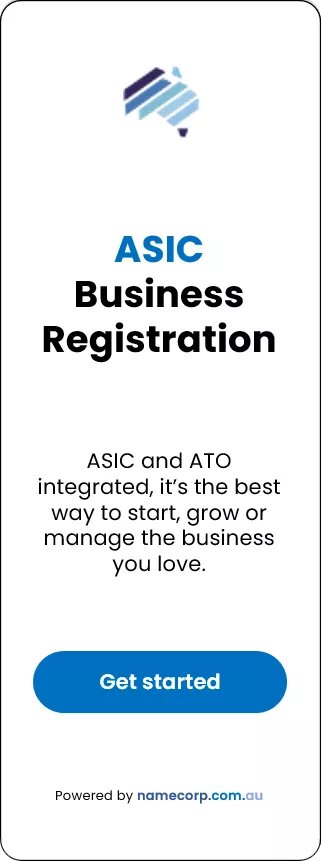Choosing the right bank account is crucial for the success of any small business. The right account can help manage your cash flow, minimize fees, and even earn interest on your idle funds.In Australia, the Big Four banks—Commonwealth Bank, NAB, ANZ, and Westpac—offer a variety of business bank accounts, each with its unique features, fees, and benefits. This article will guide you through the best business bank accounts from these banks for small businesses in Australia, helping you make an informed decision.
High-Interest Business Savings Accounts
A business savings account is designed to hold funds that you do not need for immediate expenses. These accounts often offer higher interest rates than regular business transaction accounts, allowing you to earn interest on your surplus funds. The benefits include:
- Earning Interest: Your money grows over time, which can help your business's financial health.
- Financial Cushion: Provides a reserve for unexpected expenses or future investments.
- Easy Access: While interest rates are typically higher, you still have access to your funds when needed.
Top Picks
1. Commonwealth Bank Business Online Saver
- Interest Rate:
The interest rates for the Commonwealth Bank Business Online Saver are tiered based on the balance:
- Balances less than $50,000: 0.25% p.a.
- Balances between $50,000 and $249,999: 0.50% p.a.
- Balances between $250,000 and $999,999: 0.95% p.a.
- Balances $1,000,000 and over: 1.25% p.a. (CommBank)
- Fees: No monthly fees.
- Features: Online access, linked to a transaction account, interest calculated daily and paid monthly.
- Pros: No monthly fees, easy online management.
- Cons: Lower interest rate compared to some competitors.
- For more detailed information, you can visit the Commonwealth Bank Business Online Saver page.
2. NAB Business Cash Maximiser
- Interest Rate: 1.15% p.a.
- Fees: No monthly fees.
- Features: No minimum balance, online access, interest paid monthly.
- Pros: Competitive interest rate, no monthly fees.
- Cons: Limited branch access for account-specific inquiries.
- For more detailed information, you can visit the NAB Business Cash Maximiser page
3. ANZ Business Advance Saver
- Interest Rate: 1.25% p.a for balances of $5000 or more
- Fees: No monthly fees.
- Features: Interest calculated daily and paid monthly, linked transaction account.
- Pros: No monthly fees, solid interest rate.
- Cons: Requires a linked ANZ transaction account.
- For more detailed information, you can visit the ANZ Business Online Saver page
4. Westpac Business Cash Reserve
- Interest Rate: 1.1% p.a.
- Fees: No monthly fees.
- Features: Online banking, interest calculated daily and paid monthly.
- Pros: No monthly fees, reliable online banking.
- Cons: Interest rate is on the lower end compared to NAB.
- For further details, you can visit Westpac's official page
How Interest Rates Are Calculated and How They Can Change
Interest rates on business savings accounts are typically calculated daily and paid out monthly. The rate can change based on various factors, including:
- Economic Conditions: Central bank policies and market conditions can influence rates.
- Bank Policies: Individual banks may adjust rates based on their financial strategies.
- Promotional Offers: Some banks offer introductory rates that change after a set period.
Business Transaction Accounts
A business transaction account is essential for managing your daily financial activities. These accounts are used for receiving payments, paying suppliers, and handling payroll. They are designed for frequent transactions and offer features like online banking, business debit cards, and overdraft facilities.
Top Picks
1. Commonwealth Bank Business Transaction Account
- Fees: $10 monthly fee, unlimited electronic transactions.
- Transaction Limits: Unlimited electronic transactions.
- Features: Online banking, business debit card, overdraft facility.
- Pros: Unlimited online transactions, comprehensive online banking tools.
- Cons: Monthly fee.
2. NAB Business Everyday Account
- Fees: $10 monthly fee, free electronic transactions, fees for in-branch transactions.
- Transaction Limits: Unlimited electronic transactions.
- Features: Online banking, mobile app, business debit card.
- Pros: No transaction fees for electronic transactions, excellent mobile app.
- Cons: In-branch transaction fees.
3. ANZ Business Advantage
- Fees: $10 monthly fee, includes 20 free transactions, $0.50 per additional transaction.
- Transaction Limits: 20 free transactions per month.
- Features: Overdraft facility, online banking, mobile banking.
- Pros: Overdraft facility, strong online and mobile banking tools.
- Cons: Limited free transactions, additional transaction fees.
4. Westpac Business One Low Plan
- Fees: $10 monthly fee, includes 25 free transactions, $0.50 per additional transaction.
- Transaction Limits: 25 free transactions per month.
- Features: Online banking, business debit card, mobile banking.
- Pros: Generous free transaction limit, good online banking features.
- Cons: Monthly fee, additional transaction fees.
Best Company Bank Accounts
When selecting the best company bank accounts, consider the following criteria:
- Fees: Monthly account fees, transaction fees, and any hidden charges.
- Features: Online banking, mobile apps, integration with accounting software.
- Interest Rates: For savings accounts, consider the interest rates offered.
- Customer Service: Availability and quality of customer support.
Top Picks
1. Commonwealth Bank Business Transaction Account
- Description: Offers a range of features including online banking, a dedicated business advisor, and international payment services.
- Pros: Excellent customer support, comprehensive features.
- Cons: Higher fees compared to basic accounts.
- Real-Life Example: A tech startup used this account for its international transactions and appreciated the dedicated business advisor's support.
2. NAB Business Everyday Account
- Description: Tailored for growing businesses, this account includes overdraft facilities, a business credit card, and cash flow management tools.
- Pros: Versatile features, supports business growth.
- Cons: Monthly fees can be high for small businesses.
- Real-Life Example: A retail business found the cash flow management tools invaluable for managing seasonal sales fluctuations.
3. ANZ Business Advantage
- Description: Offers overdraft facilities, strong online banking, and mobile banking tools.
- Pros: Comprehensive online banking, mobile banking, and overdraft facility.
- Cons: Limited free transactions.
- Real-Life Example: A consultancy firm used this account to manage client payments and appreciated the robust online banking tools.
4. Westpac Business One Low Plan
- Description: Provides a business debit card, online banking, and a generous number of free transactions per month.
- Pros: Generous free transaction limit, good online banking features.
- Cons: Monthly fee, additional transaction fees.
- Real-Life Example: A small e-commerce business used this account for its daily transactions and found the free transaction limit beneficial.
Comparing Business Bank Accounts
To compare business bank accounts, consider the following methodology:
- Identify Key Features: Look at fees, transaction limits, online banking capabilities, and customer support.
- Gather Data: Collect information from various banks' official websites and customer reviews.
- Analyze and Compare: Create a comparison table to highlight differences and similarities.
Detailed Comparison Table
| Bank Account | Monthly Fee | Free Transactions | Interest Rate (p.a.) | Online Banking | Customer Support | Key Features |
|---|---|---|---|---|---|---|
| Commonwealth Business Online Saver | $0 | N/A | 0.25% - 1.25% | Yes | Excellent | No monthly fee, easy online management, requires linked account |
| NAB Business Cash Maximiser | $0 | N/A | 1.15% | Yes | Good | Competitive interest rate, no monthly fees |
| ANZ Business Advance Saver | $0 | N/A | 1.25% | Yes | Good | No monthly fees, requires linked ANZ transaction account |
| Westpac Business Cash Reserve | $0 | N/A | 1.35% | Yes | Good | Reliable online banking, no monthly fees, requires linked Westpac account |
| Commonwealth Business Transaction | $10 | Unlimited | N/A | Yes | Excellent | Unlimited electronic transactions |
| NAB Business Everyday | $10 | Unlimited | N/A | Yes | Excellent | No transaction fees for electronic transactions |
| ANZ Business Advantage | $10 | 20 | N/A | Yes | Excellent | Overdraft facility, mobile banking |
| Westpac Business One Low Plan | $10 | 25 | N/A | Yes | Good | Generous free transaction limit |
Commonwealth Business Online Saver: Best for businesses looking to earn a moderate interest on idle funds without paying monthly fees.
NAB Business Cash Maximiser: Ideal for businesses seeking a competitive interest rate on their savings with no monthly fees.
Commonwealth Business Transaction: Suitable for businesses that primarily conduct electronic transactions and want to avoid transaction limits.
Westpac Business One Low Plan: Ideal for small businesses that have a moderate number of monthly transactions and need a comprehensive online banking solution.
Industry-Specific Considerations
Different industries have unique banking needs. Here are some considerations for various sectors:
High Transaction Volume Businesses
-
Requirements: Accounts with unlimited transactions, low transaction fees.
- Recommended Accounts: Commonwealth Business Transaction, NAB Business Everyday.
International Payment Businesses
- Requirements: Accounts with low international transaction fees, multi-currency support.
- Recommended Accounts: ANZ Business Advantage, Commonwealth Business Transaction.
Best Bank for Small Business
When choosing a bank for your small business, consider:
- Customer Service: Availability of support when you need it.
- Online Features: Ease of use and functionality of online and mobile banking tools.
- Support for Small Businesses: Look for banks that offer specialized services or advisors for small businesses.
Top Banks That Cater to Small Businesses
1. Commonwealth Bank
- Features: Dedicated small business advisors, extensive online banking tools.
- Special Offers: Discounts on business loans and credit cards for new accounts.
2. NAB
- Features: Robust online banking, integration with accounting software.
- Special Offers: Fee waivers for the first year for new businesses.
3. ANZ
- Features: Strong online and mobile banking tools, overdraft facilities.
- Special Offers: Cash bonuses for opening new accounts.
4. Westpac
- Features: Excellent mobile banking app, business support services.
- Special Offers: Competitive rates on business loans.
Opening and Managing Your Business Bank Account
Steps to Open an Account
- Choose the Right Account: Based on your business needs, select the best account type.
- Gather Documents: Typically includes proof of identity, business registration, and ABN.
- Apply Online or In-Branch: Most banks offer online applications, but in-branch visits may be necessary for certain accounts.
- Set Up Online Banking: Once approved, set up online banking and link it to your accounting software if applicable.
Tips for Effective Account Management
- Use Online Banking: Monitor transactions and manage funds efficiently.
- Automate Payments: Set up automatic payments to save time and avoid late fees.
- Regularly Review Statements: Check for any errors or unauthorized transactions.
Regulatory Landscape and Security of Deposits
- Regulation: Banks in Australia are regulated by the Australian Prudential Regulation Authority (APRA).
- Deposit Security: The Australian government guarantees deposits up to $250,000 under the Financial Claims Scheme.
Security and Fraud Prevention
Overview of Security Measures
- Two-Factor Authentication: Adds an extra layer of security by requiring a second form of verification.
- Encryption: Protects your data during transmission and storage.
- Liability Protection: Many banks offer liability protection against fraudulent transactions.
Bank Policies
Each bank has its own security policies. Check with your bank to understand their specific measures and what you need to do to ensure your account is secure.
Banking Fees and How to Avoid Them
Types of Fees
- Monthly Fees: Regular charges for maintaining the account.
- Transaction Fees: Fees for each transaction beyond the free limit.
- Overdraft Fees: Charges for overdrawing your account.
Strategies to Avoid Fees
- Choose the Right Account: Select an account with fees that match your usage.
- Maintain Minimum Balances: Some accounts waive fees if you keep a minimum balance.
- Use Electronic Transactions: Many banks offer free electronic transactions but charge for in-branch services.
Integration with Accounting Software
Benefits
Integrating your bank account with accounting software can:
- Streamline Financial Management: Automate transaction recording and reconciliation.
- Save Time: Reduce manual data entry.
- Improve Accuracy: Minimize errors in financial records.
Bank Offerings
- Commonwealth Bank: Integrates seamlessly with Xero and QuickBooks.
- NAB: Offers easy integration with MYOB and other popular platforms.
- ANZ: Compatible with a range of accounting software.
- Westpac: Provides integration with various financial management tools.
Customer Reviews and Testimonials
Real-Life Experiences
Jane’s Retail Shop
- Account: Commonwealth Business Transaction Account.
- Experience: "The dedicated business advisor helped us navigate international payments seamlessly."
John's Consultancy
- Account: NAB Business Everyday Account.
- Experience: "Integration with MYOB saved us hours of bookkeeping each month."
Additional Financial Products for Small Businesses
In addition to business bank accounts, consider other financial products:
- Business Credit Cards: Useful for managing expenses and earning rewards.
- Overdraft Facilities: Provides a buffer for short-term cash flow issues.
- Business Loans: For funding expansion or purchasing equipment.
Choosing the Right Products
- Assess Your Needs: Determine what products will best support your business operations.
- Compare Offers: Look at interest rates, fees, and terms from different providers.
Future Trends and Innovations
Emerging Trends
- Mobile Banking: Increasingly sophisticated apps for managing business finances on the go.
- AI-Powered Tools: Automated financial management tools using artificial intelligence.
- Open Banking: Improved data sharing between financial institutions for better service offerings.
Impact on Businesses
These innovations can:
- Enhance Efficiency: Automate routine tasks and provide better financial insights.
- Improve Accessibility: Make banking services more accessible and user-friendly.
Tax Implications
Different business bank accounts and financial products can have tax implications:
- Interest Earned: Interest on savings accounts is taxable income.
- Loan Interest: Interest on business loans may be tax-deductible.
Glossary of Terms
Common Banking Terms
-
APRA (Australian Prudential Regulation Authority): The regulatory body responsible for overseeing banks, credit unions, insurance companies, and other financial institutions in Australia.
-
ABN (Australian Business Number): A unique 11-digit identifier issued to businesses by the Australian Taxation Office (ATO).
-
Overdraft: A facility that allows you to withdraw more money than is available in your account, up to an agreed limit.
-
p.a. (Per Annum): A term meaning "per year" used to describe interest rates or fees that are calculated on an annual basis.
-
BPay: An electronic bill payment system in Australia that allows payments via online or telephone banking.
-
Direct Debit: An arrangement where a business authorizes the bank to collect money directly from a customer's account to pay for goods or services.
-
EFTPOS (Electronic Funds Transfer at Point of Sale): A system that allows customers to pay for goods and services using a debit or credit card at the point of sale.
-
Interest Rate: The percentage charged on a loan or paid on savings accounts, usually expressed as an annual percentage.
-
Term Deposit: A type of savings account where money is deposited for a fixed period of time at a fixed interest rate.
-
SWIFT Code: A unique identifier for banks used in international wire transfers to ensure the money is sent to the correct financial institution.
-
BSB (Bank State Branch): A six-digit number used to identify individual branches of Australian banks.
-
Settlement Date: The date on which a payment or transaction is completed.
-
Minimum Balance: The minimum amount of money that must be maintained in an account to avoid fees or qualify for certain benefits.
-
Transaction Fees: Fees charged for specific transactions such as withdrawals, deposits, or transfers.
-
Merchant Account: A type of bank account that allows businesses to accept payments by debit or credit cards.
-
Annual Fee: A yearly fee charged for maintaining a bank account or using a credit card.
-
Foreign Exchange Rate: The rate at which one currency can be exchanged for another, which affects international transactions.
-
Principal: The original sum of money borrowed in a loan or invested in a savings account, not including interest or earnings.
-
Reconciliation: The process of comparing bank statements to the company's financial records to ensure they match.
-
Cheque: A written order directing a bank to pay a specific amount of money from one person's account to another person or entity.
-
Clearing: The process of settling a transaction, ensuring the correct amount of money is transferred between parties.
-
Mobile Banking: Accessing banking services via a mobile device, such as a smartphone or tablet, using a dedicated app or mobile-optimized website.
-
Online Banking: Managing bank accounts and conducting financial transactions via the internet.
-
Credit Rating: A score or rating that reflects an individual's or business's creditworthiness based on their credit history.
-
Business Line of Credit: A flexible loan option for businesses that allows them to borrow up to a certain limit and pay interest only on the amount borrowed.
Choosing the right business bank account is vital for managing your small business's finances effectively. Consider your specific needs, compare different accounts, and take advantage of additional financial products and innovations. By doing so, you can find the best fit for your business and set yourself up for financial success.
FAQs
Q1: What documents do I need to open a business bank account?
- A1: Typically, you need proof of identity, business registration, and your ABN.
Q2: Can I integrate my bank account with accounting software?
- A2: Yes, many banks offer integration with popular accounting platforms like Xero and QuickBooks.
Q3: How can I avoid banking fees?
- A3: Choose an account with fees that match your usage, maintain minimum balances, and use electronic transactions.
Q4: What are the main differences between a business transaction account and a business savings account?
- A4: A business transaction account is designed for daily financial operations like receiving payments, paying suppliers, and handling payroll. It often has features such as unlimited transactions and overdraft facilities. A business savings account, on the other hand, is intended to hold surplus funds and earn interest, typically offering higher interest rates but limited transaction capabilities.
Q5: Can I open a business bank account if I’m a sole trader?
- A5: Yes, sole traders can open business bank accounts. The bank will usually require your Australian Business Number (ABN) and proof of identity.
Q6: What documents do I need to open a business bank account?
- A6: Common documents include proof of identity (e.g., driver's license or passport), business registration documents, your ABN, and sometimes proof of address. Requirements may vary slightly between banks.
Q7: Are there any fees for transferring money between my business accounts at the same bank?
- A7: Many banks do not charge fees for transfers between accounts held at the same bank, especially if done online. However, it's best to check with your specific bank for their policy.
Q8: How can I improve my chances of getting approved for a business loan or overdraft facility?
- A8: To improve your chances, maintain a good credit score, prepare a solid business plan, show consistent cash flow, and have all necessary documentation ready. Building a good relationship with your bank can also help.
Q9: What is the difference between a business debit card and a business credit card?
- A9: A business debit card is linked directly to your transaction account, allowing you to spend money that is already in the account. A business credit card, on the other hand, allows you to borrow money up to a certain limit and pay it back later, often with interest.
Q10: Can I link my business bank account to my accounting software?
- A10: Yes, many banks offer the ability to link your business bank account to popular accounting software like Xero, QuickBooks, and MYOB, which can help automate transaction recording and reconciliation.
Q11: What should I do if I detect a fraudulent transaction on my business account?
- A11: Immediately report the fraudulent transaction to your bank. Most banks have dedicated fraud teams that will investigate and help resolve the issue. It’s also important to review your account security settings and take steps to prevent future fraud.
Q12: Are business bank accounts protected by the Financial Claims Scheme (FCS)?
- A12: Yes, eligible deposits in business bank accounts are protected up to $250,000 per account holder, per institution, under the Financial Claims Scheme (FCS) in Australia.
Q13: What are the benefits of having a dedicated business bank account instead of using a personal account for business transactions?
- A13: A dedicated business bank account helps keep your personal and business finances separate, which simplifies bookkeeping and tax reporting. It also provides a professional image for your business and often includes features tailored to business needs, such as transaction limits and business support services.
Q14: How can I avoid overdraft fees on my business account?
- A14: To avoid overdraft fees, regularly monitor your account balance, set up alerts for low balances, maintain a buffer in your account, and consider linking a savings account for automatic transfers to cover shortfalls.
Q15: What should I consider when choosing a bank for my small business?
- A15: Consider factors such as fees, interest rates, account features, customer service, convenience of branch locations, online and mobile banking capabilities, and any special services or support for small businesses.



